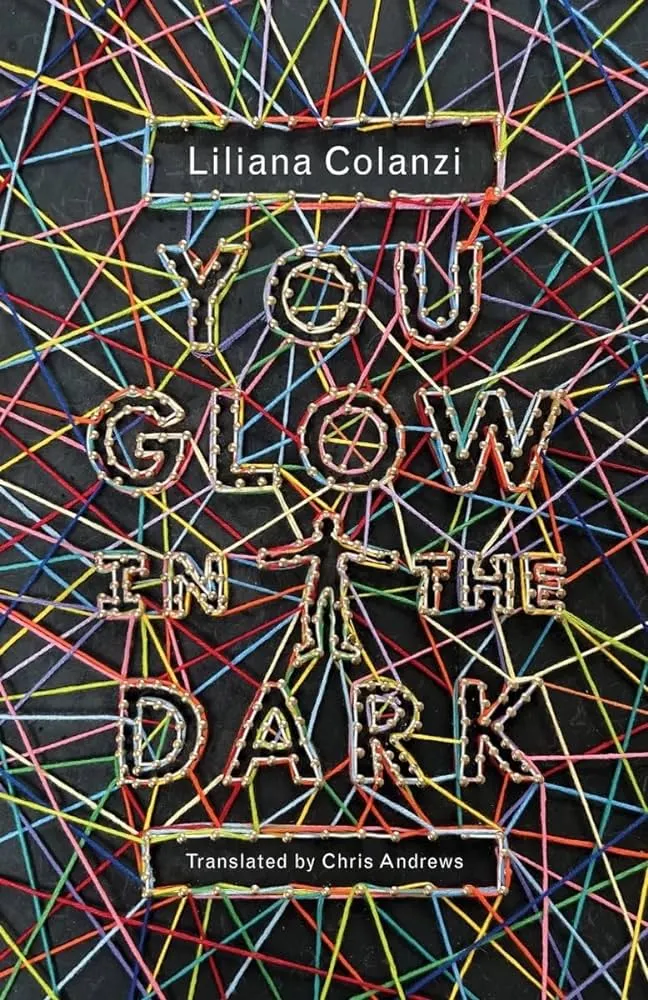
A Review of You Glow In The Dark
Words By Sara Santistevan
*SPOILER ALERT *This review contains plot details of You Glow in the Dark.
Published on February 06, 2024 by New Directions Publishing.
You Glow in the Dark is Liliana Colanzi’s breathtaking and haunting English debut. This collection of speculative short stories contemplates radioactive violence, environmental resiliency, and the ghostly inheritance of colonialism through the lenses of horror and cyberpunk fiction. With its heart situated in the Bolivian altiplano, Colanzi’s stories expand our political imagination through an interrogation of a history fraught with survival and revolution.
Although my knowledge of Bolivian history only extends to the research I did in relation to this collection, as a third-generation Latina, I’m aware of the specific and chilling ways the history of colonization lingers in Latin American communities. Stories like “The Greenest Eyes,” which explores a mestiza girl’s willingness to make a Faustian deal for eyes as green of those of her Italian father’s, felt all-too familiar, but may be read by other audiences as purely fantastical.
Similarly, when the narrator of “Chaco” is possessed by the ghost of a Mataco man he killed, I’m inclined to think of it less as a “ghost” story and more as historical fiction with paranormal elements. The region of Gran Chaco in Bolivia is marred with the forced expulsion of multiple indigenous groups, wars, and conservation issues because the land is rich in oil. The Mataco man’s words echoing in the narrator’s head reveal the truth that emerges when history is not told by the victors: “The river turned to poison, the fish turned belly up and died. Hunger was great, hunger was long, and food in short supply.” This incantation also serves as a warning for what could happen if a society continues to prioritize profit and resources over the land and the environment.
One possible future is imagined in one of my favorite stories in the collection, “Atomito.” This story follows numerous characters in an Andean cyberpunk society that revolves around a nuclear power plant ironically named after Túpac Katari, a revolutionary leader in colonial-era Bolivia. Looming in the background of the narrative is an impending radioactive disaster intertwined with a mysterious and fictional Andean deity, Atomito, who is linked to an actual Andean deity, Pachamama. The prose is flavored with Snow Crash-eque irreverancy, vocabulary from the Andes and Japanese diaspora in Santa Cruz de la Sierra, and the unique ways five young adults survive in this bizarre ecosystem. I was immediately hypnotized by Colanzi’s transcendent worldbuilding and felt connected to each character’s drive, desires, and fate. My only critique of this story is that I wish it was longer—I would be thrilled to read a novel as long as Snow Crash about this world and these characters.
Speaking of radioactive disasters, I can’t discuss You Glow in the Dark in good faith without discussing the final story in the collection, also titled “You Glow in the Dark.” This story is inspired by the unspeakably tragic 1987 Goiânia accident, wherein hundreds of individuals were exposed to highly radioactive caesium chloride. In such tragedies, it is easy to see statistics and forget the humanity of the individual lives lost. Colanzi rectifies this by creating compelling and unique stories for the otherwise voiceless: from the imagined perspectives of the families directly impacted to fictional accounts of the hundreds of thousands rushed to local hospitals to check exposure levels.
The story that haunts me the most is that of Devair Alves Ferreira, who, in both real life and the story, comes across the container of caesium chloride in his scrapyard after it was sold to him. In the narrative, he discovers it glowing blue in the night, and although the eerie luminescence reminds him “of the dead, of the devil, of aliens,” he is fascinated and brings it home to show his family. As an unfortunate result, Devair is left the sole survivor of his family, and his survival is turned into spectacle: “Open your eyes, ladies and gentlemen, what you are about to see is not for the fainthearted: the glow of death, the phosphorence of sin, the man who shines in the darkness.” If this glowing substance contains the allure of Pandora’s Box, perhaps the sole hope that remains is that some of us will survive these environmental disasters—and, if nothing else, Earth will survive, as it has for centuries, as Colanzi vividly displays in “The Cave,” a condensed epic of the history of our planet.
As the back cover blurb of You Glow in the Dark asserts, despite the diverse nature of each of these stories, “all are superbly executed and yet hard to pin down; they often leave the reader wondering: Was that realistic or fantastic?” This was one factor that drew me to read You Glow in the Dark, and Colanzi deftly delivers. I’ve been longing to read more works that eschew a traditional Western narrative arc for appealing to dream logic. However, there were some moments in this collection where I found myself longing for a little more grounding to understand what was happening in a narrative. At times, I oscillated between a lingering sense of wonder at Colanzi’s boundlessly imaginative narratives or worrying that my confusion had led me to misinterpret a story.
Nevertheless, despite occasional moments of narrative ambiguity, the overall enchanting experience offered by You Glow in the Dark is undeniable. This is easily one of my favorite reads of late, as it is one of those rare short story collections that transports me beyond the ordinary yet leaves me with a better understanding of it. Colanzi’s talent to pull from the traditions of horror and speculative fiction and transform them into something uniquely her own showcases the important role genre literature can play in highlighting stories previously relegated to the shadows.